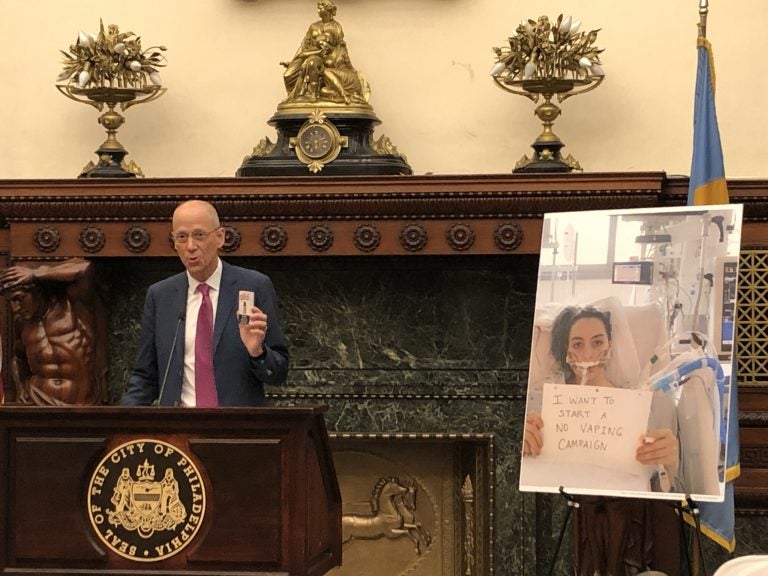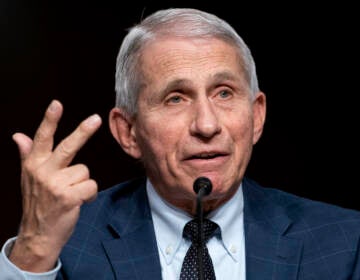Amid hospitalizations, Philadelphia officials propose a flavored vape ban for minors
The bill is not as sweeping as other cities’ proposed vaping bans, but Philadelphia Health Commissioner Thomas Farley says that’s intentional.

Philadelphia Health Commissioner Tom Farley explains that each Juul cartridge contains roughly the same amount of nicotine as two packs of cigarettes. (Nina Feldman/WHYY)
As dozens of vaping-related lung illnesses are being investigated across Pennsylvania, Philadelphia Mayor Jim Kenney and Health Commissioner Thomas Farley announced Wednesday that they will introduce legislation to ban flavored e-cigarettes and vape pods from stores that sell to minors.
There have been approximately 12 cases of vape-related lung illness in Philadelphia, and the first death caused by the disease in Pennsylvania was reported earlier this month.
Statistics show those affected by the lung disease are disproportionately young. According to the Centers for Disease Control and Prevention, nearly 80% of the people who have the severe lung disease nationwide are under the age of 35, and 15% are under the age of 18.
The Philadelphia bill targets minors because vaping is popular among teens and high schoolers. E-cigarette use in teenagers across the country had been going down, but from 2017 to 2019 it doubled. In 2018, the National Institute on Drug Abuse found that almost 40% of 12th graders reported vaping.
“These teens are not smokers trying to quit,” Farley said. “These kids are kids getting addicted to an entirely new product.”
The measure would prohibit flavored e-cigarettes and cartridges such as mango, mint and watermelon, widely understood to appeal to minors, from convenience stores, gas stations, and other locations that sell tobacco products where minors can shop. It would also restrict those outlets from carrying vape pods that contain high levels of nicotine. Flavored products and those with high levels of nicotine would still be available at specific vaping shops, or other tobacco outlets where minors are not permitted.
“There may be some cases for adult smokers who are trying to quit that there is some value to e-cigarettes,” Farley said. “That’s why this is a balanced bill.”
In other cities where blanket bans have been implemented, critics have cautioned that such prohibition would simply drive young people who want to vape flavored pods to buy them online or in unregulated underground markets, where the contents of the oils are even less certain.
Mayor Kenney acknowledged that no one bill could solve the problem of minors using the products entirely.
“Kids are resourceful — I know when I was a kid, I was resourceful,” he said. “We’re taking an approach that we think is balanced and will reduce the availability of the product to many, many kids.”
Alongside the legislation, the health department will roll out an education campaign on social media. Dubbed “Behind the Haze,” the effort will aim to communicate the health risks of vaping to teens, and make the argument that the e-cigarette industry is only marketing to young people to make a profit.
Dissuading young people from vaping and urging them to quit is great, said Mary Doherty, of Counseling Or Referral Assistance Services (CORA), which offers addiction services for young people. But, she said, that’s only the beginning.
“We do not have resources as providers to be able to make referrals or do something to the degree we need to once we determine that’s the issue,” she said, adding that she supports the bill but hopes it can be expanded to include resources for intervening with kids who have become addicted and need help quitting.
Doherty said there is still a lot to figure out regarding proper nicotine-addiction treatment protocols for young people, such as whether typical nicotine replacement therapy (patches or lozenges) makes sense for minors. Plus, she said, young people are very reluctant to get treatment in the first place.
“You know, they’re teenagers, [they think] they can stop any time they want and life is good,” she said. “But they can’t stop. They’re finding they cannot stop Juuling.”
Farley said the bill was designed with the notion that e-cigarette companies, such as Juul, might challenge the law on the basis that less restrictive smoking laws on the state level take precedence over any local ordinance. This practice, known as pre-emption, was a popular strategy among big tobacco companies in the 1980s, and the vape industry has started using the tactic against other cities passing anti-vape bills as well.
“If companies want to take us to court, they can take us to court,” Farley said. “But we think this is the right thing to do to protect our children.”
Juul began in 2015, and by 2017 its sales had increased by more than 600%. In 2018, Altria, the parent company of Philip Morris, bought 35% of Juul shares for $12.8 billion.
The new bill will be introduced in Philadelphia City Council on Thursday and is sponsored by Councilmembers Bill Greenlee and Cindy Bass and Council President Darrell Clarke.
WHYY is your source for fact-based, in-depth journalism and information. As a nonprofit organization, we rely on financial support from readers like you. Please give today.





